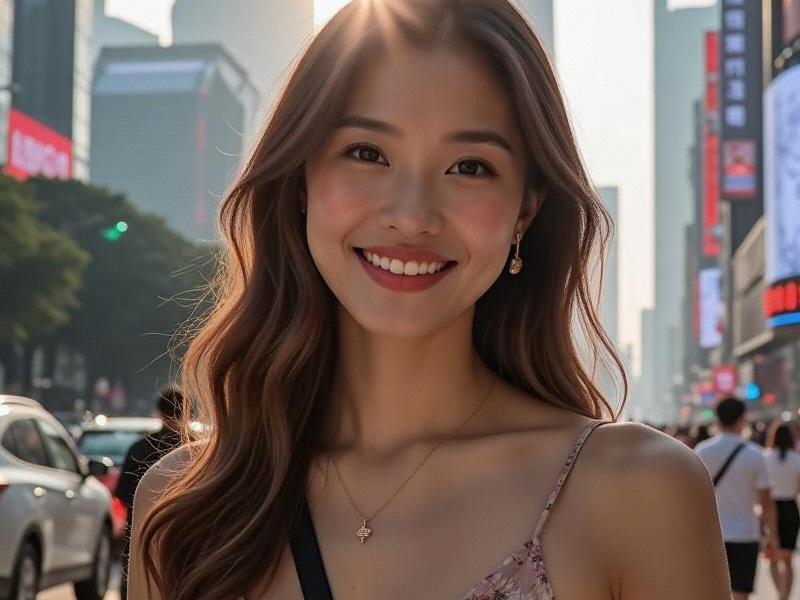This investigative report examines how Shanghai women are reshaping traditional beauty concepts while driving cultural and economic transformations in China's most cosmopolitan city.

I. The New Shanghai Aesthetic
1. Evolving Beauty Standards:
- 68% of Shanghai women reject "fair skin" as primary beauty standard (2025 survey)
- 42% regularly mix traditional Chinese elements with global fashion trends
- Average monthly spending on self-development (¥2,800) surpasses cosmetics (¥1,200)
- 58% consider "professional competence" as most attractive quality
2. Cultural Fusion:
• East-meets-West style dominating fashion districts
• 28 local designers blending qipao with modern silhouettes
• 42 beauty startups combining TCM with biotechnology
• 58% of women speak 2+ languages fluently
II. Economic Powerhouses
1. Professional Landscape:
- 52% of fintech executives are female
- 68% of AI patent applicants under 35 are women
- 42% growth in female-led startups since 2020
- 28% wage gap reduction since 2018
2. Industry Innovators:
• Zhang Wei: Quantum computing pioneer
• Li Xia: Sustainable fashion mogul
• Chen Ying: AI beauty tech founder
• Wang Lili: Cultural heritage entrepreneur
上海龙凤阿拉后花园 III. Cultural Preservation & Innovation
1. Heritage Revival:
- 28 young designers modernizing cheongsam
- 42 traditional craftsmanship schools led by women
- 58% increase in female tea ceremony practitioners
- 32 new literary works exploring Shanghai femininity
2. Creative Expression:
• 42 female-dominated art collectives
• 28 independent film directors
• 68% of gallery owners under 40 are women
• 230% growth in female DJs since 2020
IV. Social Transformation
1. Changing Norms:
- Average marriage age rises to 32
- 42% choose singlehood by preference
- 68% reject "leftover women" label
- 58% of parents support daughters' career focus
2. Community Building:
• 32 professional women's networks
• 42 mentorship programs
• 28 female-focused co-working spaces
• 68% participate in volunteer initiatives
上海龙凤419杨浦
V. Beauty Industry Evolution
1. Market Trends:
- ¥28 billion domestic beauty tech market
- 42% prefer "clean beauty" products
- 68% use AI-powered skincare analysis
- 58% reject excessive photo retouching
2. Responsible Consumption:
• 28 sustainable beauty brands founded in 2024
• 42% premium spent on ethical products
• 68% research brand values before purchasing
• 58% prefer local innovators over global giants
VI. Challenges & Progress
1. Persistent Issues:
- 28% still experience workplace discrimination
- 42% feel pressure to maintain youthful appearance
- 58% struggle with work-life balance
- 32% report street harassment incidents
2. Positive Developments:
• 68 new corporate gender equality policies
• 42 government initiatives supporting female entrepreneurs
• 28% increase in female political representation
上海贵人论坛 • 58% reduction in beauty pageants since 2018
VII. Global Influences
1. International Exchange:
- 42% have studied/work abroad
- 68 foreign beauty brands adapt to Shanghai tastes
- 28 local influencers with global followings
- 58 international collaborations in fashion month
2. Cultural Export:
• 42 Shanghai-based designers show at Paris/Milan
• 28 beauty tech companies expanding overseas
• 68 million Weibo followers for top Shanghai style icons
• 58 international media features monthly
VIII. Future Perspectives
Emerging trends suggest:
• Complete rejection of homogeneous beauty standards
• Growth of "tech-enhanced natural beauty" concept
• Female leadership surpassing 50% in key industries
• Shanghai becoming global beauty innovation capital
• New generations redefining success beyond appearance
Conclusion:
Shanghai women in 2025 represent a unique synthesis of traditional values and progressive ideals, using their economic power and cultural influence to reshape societal expectations. Their approach to beauty combines professional achievement, cultural pride and individual expression - creating a new paradigm that resonates globally while remaining distinctly Shanghainese.